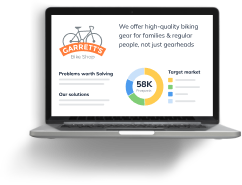Craving success in the bakery world? Ready to whip up a business venture that satisfies the sweet tooth of your customers? Writing a bakery business plan is the secret ingredient to turning your passion for baking into a thriving and profitable enterprise.
This article will guide you through the process of crafting a bakery business plan that will make your dreams rise to perfection. Get ready to mix, bake, and savor the journey of building your very own bakery empire! Need more guidance? Check out our free bakery business plan example.
Why Write a Bakery Business Plan?
Just as a baker meticulously measures ingredients to achieve the perfect texture and flavor, a bakery business plan allows you to carefully plan each aspect of your business. It acts as your roadmap, providing direction and focus as you start your bakery journey. A well-crafted business plan is essential for securing funding from investors and lenders who want to see that you have a solid understanding of your market, a viable financial plan, and a clear strategy for growth.
Conduct market research
Before you start whisking flour and sugar together, it’s important to conduct thorough market research to understand the cravings and preferences of your target customers. Market research involves analyzing your target market, assessing the competition, and identifying trends that will shape your bakery’s success.
Define your target market
Consider factors such as age, income level, dietary preferences, and local demographics. Are you targeting health-conscious individuals, families, or specialty dessert enthusiasts? Understanding your target market helps you tailor your offerings to meet their specific needs and desires.
Analyze the competition
Visit local bakeries, patisseries, and cafes to get a sense of their offerings, pricing, and customer experience. Identify their strengths and weaknesses, and look for opportunities to differentiate your bakery. What unique products or services can you offer? Is there a gap in the market that you can fill?
When conducting market research for your bakery, consider the following:
- Customer Preferences: Identify the types of baked goods that are in high demand. Do customers prefer traditional treats, artisanal bread, gluten-free options, or vegan pastries? Understanding customer preferences allows you to tailor your menu to their tastes.
- Location Analysis: Evaluate potential locations for your bakery. Consider foot traffic, visibility, parking availability, and proximity to complementary businesses. A prime location can significantly impact your bakery’s success.
- Product Differentiation: Identify what sets your bakery apart from the competition. Is it your secret family recipe, organic ingredients, or unique flavor combinations? Highlighting your unique selling points will help you attract and retain customers.
- Online Presence: Establish a strong online presence through a user-friendly website and active social media accounts. Share mouthwatering photos, engage with customers, and promote special offers to build an online following.
Market your business
A bakery is not just about baking—it’s about creating an irresistible experience for your customers. Developing effective promotional strategies helps you showcase your bakery’s offerings, build brand awareness, and attract a loyal customer base.
Consider the following promotional strategies for your bakery:
- Eye-Catching Displays: Invest in attractive displays that showcase your baked goods and entice customers. Use window displays, enticing signage, and appealing packaging to create a visually appealing environment.
- Sampling and Tastings: Offer samples of your signature products to passersby or during special events. Tastings allow potential customers to experience the quality and taste of your baked goods firsthand, enticing them to make a purchase.
- Special Orders and Customization: Cater to the unique needs and preferences of your customers by offering special orders and customization options. Whether it’s personalized cakes, custom cookie designs, or dietary-specific options, providing tailored baked goods creates a memorable experience and builds customer loyalty.
- Collaborate with Local Businesses: Partner with nearby coffee shops, restaurants, or event planners to expand your reach and offer joint promotions. Cross-promotions and collaborations can help you tap into new customer segments and create mutually beneficial relationships.
- Engage with the Community: Participate in local events, sponsor community initiatives, and support local charities. Engaging with the community not only creates goodwill but also raises awareness of your bakery and helps you build a loyal customer base.
Financials and pricing
Running a successful bakery requires a firm grasp of the financial aspects of your business. Developing a solid financial plan and pricing strategy ensures that your bakery remains profitable while providing value to your customers.
Consider the following financial aspects when creating your bakery business plan:
- Startup Costs: Determine the initial investment required to set up your bakery, including equipment, leasehold improvements, licenses, and inventory. Factor in costs for marketing and branding efforts as well.
- Ongoing Expenses: Identify the recurring expenses involved in running your bakery, such as rent, utilities, ingredient costs, staff wages, and marketing expenses. Regularly review these costs to ensure they align with your revenue projections.
- Pricing Strategy: Set your prices based on a thorough understanding of ingredient costs, overhead expenses, and the local market. Consider factors such as quality, portion sizes, and the value you provide to customers. Monitor pricing trends in the industry to remain competitive.
- Sales Forecasting: Develop a sales forecast based on your market research, pricing strategy, and capacity. Consider seasonal fluctuations, holidays, and events that may impact your bakery’s performance. Continuously review and adjust your forecast based on actual results.
Set milestones and goals
Just like the layers of a beautifully decorated cake, setting milestones and goals helps you track your progress and celebrate your bakery’s achievements. These goals can be both short-term and long-term, encompassing areas such as revenue targets, customer acquisition, and expanding your product offerings.
Consider the following tips when setting milestones and goals for your bakery:
- SMART Goals: Ensure your goals are Specific, Measurable, Achievable, Relevant, and Time-bound. For example, instead of aiming to “increase sales,” set a specific target, such as “increase monthly sales by 15% within six months.”
- Employee Engagement: Involve your bakery staff in setting goals and milestones. Their input and commitment are essential to achieving your bakery’s objectives.
- Regular Evaluation: Continuously monitor your progress towards your goals and assess whether adjustments are necessary. Regularly review your financials, customer feedback, and market trends to stay on track.
Looking forward
After you’ve written your business plan, you’re well on your way to creating a thriving bakery. By writing a well-crafted business plan, conducting thorough market research, developing effective promotional strategies, and understanding the financial aspects of your bakery, you’ve laid the foundation for success.
Remember, the journey of opening and running a bakery is both exciting and challenging. Embrace the creativity and joy that baking brings, stay attuned to your customers’ preferences, and adapt to the evolving trends in the industry. With a solid business plan as your recipe, your bakery can become a beloved destination for pastry enthusiasts and a sweet success story.
Free bakery business plan example
If you’re ready to start your own bakery business, you can check out our free bakery business plan example from our library of over 500 sample business plans. Get started today, and discover why businesses that plan grow 30% faster than those that don’t.
Makenna Crocker is the Social Brand Manager at Palo Alto Software. Her work focuses on market and social trends, educational content creation, and providing entrepreneurs with small business tips and tools. With a master’s degree in Advertising and Brand Responsibility from the University of Oregon, she specializes in generating a strong and responsible brand presence through social media and sharable content.







